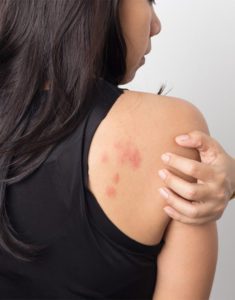By Anne Marie Tremaine, MD
 Lichen Sclerosus is an uncommon disease of the skin and mucosa that can affect anyone at any age. This condition is most frequently seen in postmenopausal women. Lichen sclerosus typically presents with thin white patches on the vulva, perineal, and anal skin. While this disease is asymptomatic for some people, many complain of itching, burning, pain, and may experience tearing or bleeding of the skin.
Lichen Sclerosus is an uncommon disease of the skin and mucosa that can affect anyone at any age. This condition is most frequently seen in postmenopausal women. Lichen sclerosus typically presents with thin white patches on the vulva, perineal, and anal skin. While this disease is asymptomatic for some people, many complain of itching, burning, pain, and may experience tearing or bleeding of the skin.
Lichen sclerosus is a chronic condition, that may wax and wane, and usually requires long term management with a dermatologist or gynecologist. It is important to treat this condition as it can continue to worsen without therapy. In addition, lichen sclerosus can increase one’s risk for a squamous cell carcinoma in the affected area, thus regular examination and follow up (every 6 – 12 months) is imperative.
The cause of lichen sclerosus is unknown. It is not infectious or contagious and may be related to the immune system attacking the skin, resulting in inflammation. This condition is often diagnosed by a simple visual exam of the involved area. If the diagnosis is unclear, a biopsy of the skin or mucosa can be done for confirmation.
The most common treatments for lichen sclerosus are topical creams. First line therapy are high potency topical steroids and these may be used in combination with steroid free creams containing estrogen or calcineurin inhibitors. Laser treatment is a new emerging therapeutic option for lichen sclerosus. A fractionated carbon dioxide laser can stimulate a wound healing response, thus promoting new, healthier skin in the area. A series of quick laser treatments can reduce or eliminate the symptoms of lichen sclerosus and decrease the need for topical steroid use.
Most patients do require intermittent therapy as this condition is chronic and tends to recur over time. If you suffer from lichen sclerosus or are experiencing similar symptoms, I recommend seeking professional evaluation.
Anne Marie Tremaine, MD
Board Certified Dermatologist
Harvard Cosmetic and Laser Medicine Fellowship
Dr. Tremaine is a board-certified dermatologist with fellowship training at Harvard Medical School in laser and cosmetic surgery. She has contributed as a dermatology expert for online and print magazines including Family Fun, msn.com, menshealth.com, and ccn.com. In addition, she frequently lectures to professional societies on her diverse research. For more information about skin care visit the Skin Wellness
Physicians website at: www.skinwellnessflorida.com









